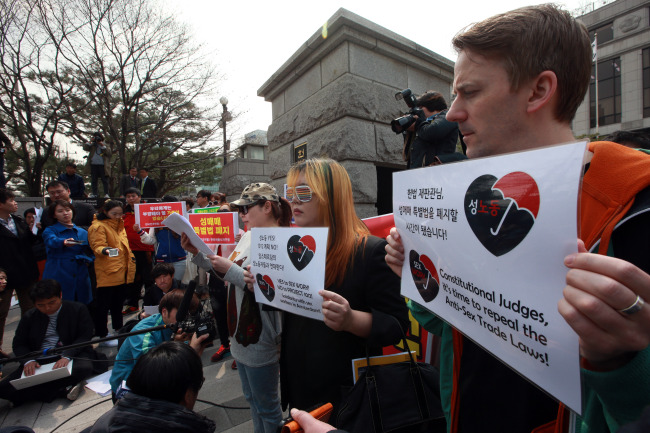The debate on legalizing prostitution has heated up in South Korea as the Constitutional Court began reviewing the law that criminalizes the sex trade. The court held its first public hearing Thursday.
The antiprostitution law was enacted in 2004 to protect human rights, partly prompted by fire that killed 14 sex workers who were locked in a brothel in Gunsan, North Jeolla Province, in 2002.
The law stipulates that both purchasing and selling of sex carry a penalty of up to one year in prison or a fine of up to 3 million won ($2,747). It gives exemption to people forced into prostitution, leaving only voluntary sex workers ― many of whom oppose the law ― subject to the punishment.
A 41-year-old woman accused of selling sex for 130,000 won filed for a constitutional review of the law in 2012. The woman argued that punishing voluntary prostitution, especially when the sex worker has no other means of income, was a violation of fundamental human rights.
The antiprostitution law was enacted in 2004 to protect human rights, partly prompted by fire that killed 14 sex workers who were locked in a brothel in Gunsan, North Jeolla Province, in 2002.
The law stipulates that both purchasing and selling of sex carry a penalty of up to one year in prison or a fine of up to 3 million won ($2,747). It gives exemption to people forced into prostitution, leaving only voluntary sex workers ― many of whom oppose the law ― subject to the punishment.
A 41-year-old woman accused of selling sex for 130,000 won filed for a constitutional review of the law in 2012. The woman argued that punishing voluntary prostitution, especially when the sex worker has no other means of income, was a violation of fundamental human rights.

“Are we (sex workers) doing something that is worse than stealing? Is what we do worse than murder?” the woman said back in 2012.
Her request for a review was granted by the Seoul Northern District Court and eventually by the Constitutional Court.
Police crackdowns on brothels have also had damaging outcomes in recent years. Last year, a prostitute in Tongyeong, South Gyeongsang Province, jumped from a motel during a raid and died. A police officer had reportedly approached her while pretending to be a client.
Those who are against the antiprostitution law claim there is little evidence that punishing sex workers is effective in curbing the sex trade. According to government data, the number of female sex workers increased by 3.8 percent from 2010 to 2013, in spite of the law.
According to a study last year by the Gender Equality Ministry, almost 80 percent of female sex workers were in their 20s and 30s as of 2013. Also, 86.6 percent of the surveyed women grew up in broken homes, while 13.4 percent suffered from poverty and domestic abuse before turning to prostitution.
Sixty percent of them began working as sex workers as teenagers after running away from home.
The Gender Equality Ministry, which regularly conducts a joint crackdown against sex workers with police, said the current law was necessary to protect women’s rights, especially teenagers.
“The idea that it’s necessary to scrap the antiprostitution law is irresponsible and dangerous,” said an official from the Korean Women Lawyers Association, which has a member representing the government during the review.
“What we need is in fact stricter punishment of the sex trade to protect our young children.”
Kim Hye-sook, a philosophy professor at Ewha Womans University also thinks the current law needs to be kept. “I would be willing to consider legalization of prostitution in a positive light if Korea was a more just and fair society,” she said.
“Yet there is still a lot of discrimination (against women) at workplaces and the glass ceiling is still pervasive. We need to examine what pushes the women into prostitution first before considering giving them freedom to choose (sex work) as their job.”
By Claire Lee (dyc@heraldcorp.com)







![[KH Explains] How should Korea adjust its trade defenses against Chinese EVs?](http://res.heraldm.com/phpwas/restmb_idxmake.php?idx=644&simg=/content/image/2024/04/15/20240415050562_0.jpg&u=20240415144419)










![[Today’s K-pop] Stray Kids to return soon: report](http://res.heraldm.com/phpwas/restmb_idxmake.php?idx=642&simg=/content/image/2024/04/16/20240416050713_0.jpg&u=)